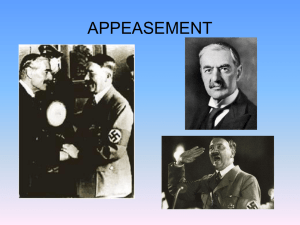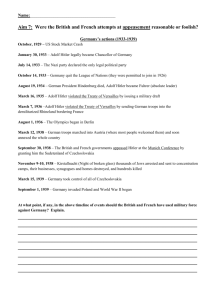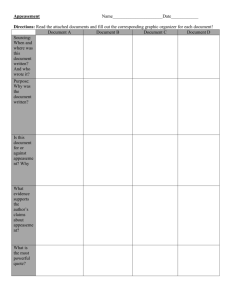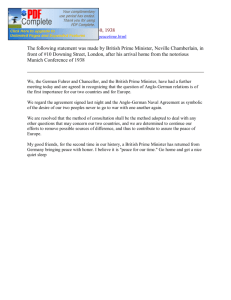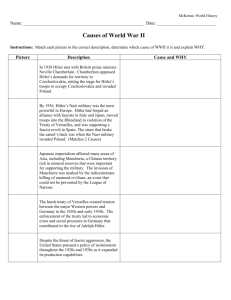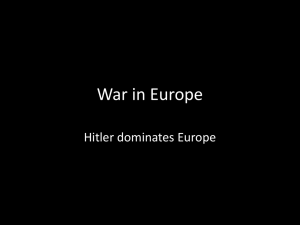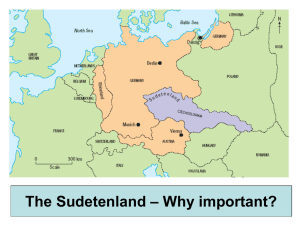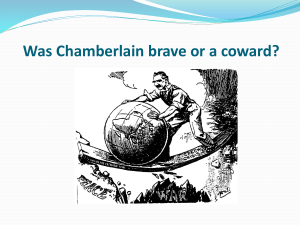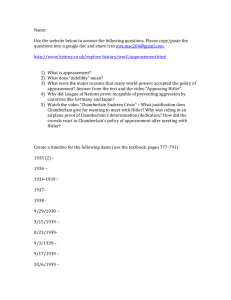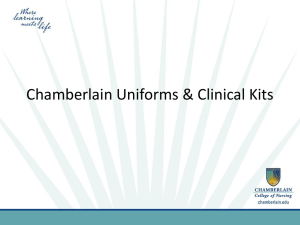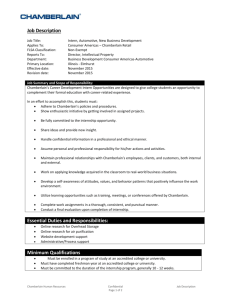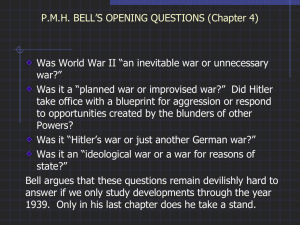worldwarIIquotes.wpd Appeasement, World War II, and Social
advertisement
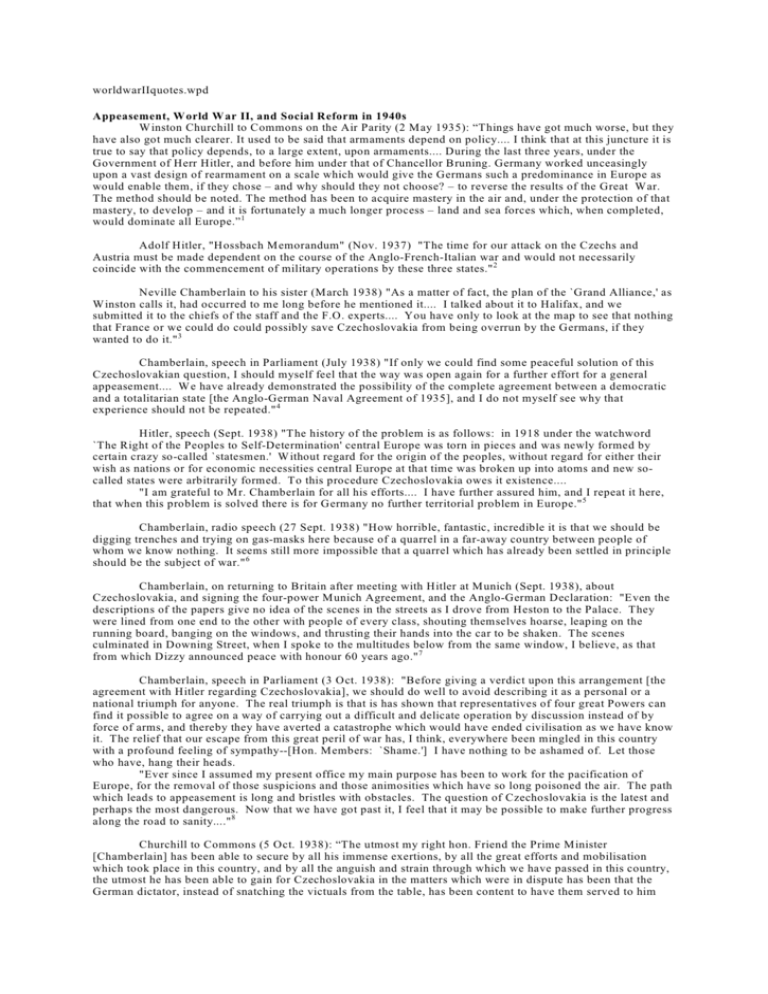
worldwarIIquotes.wpd Appeasement, W orld W ar II, and Social Reform in 1940s W inston Churchill to Commons on the Air Parity (2 M ay 1935): “Things have got much worse, but they have also got much clearer. It used to be said that armaments depend on policy.... I think that at this juncture it is true to say that policy depends, to a large extent, upon armaments.... During the last three years, under the Government of Herr Hitler, and before him under that of Chancellor Bruning. Germany worked unceasingly upon a vast design of rearmament on a scale which would give the Germans such a predominance in Europe as would enable them, if they chose – and why should they not choose? – to reverse the results of the Great W ar. The method should be noted. The method has been to acquire mastery in the air and, under the protection of that mastery, to develop – and it is fortunately a much longer process – land and sea forces which, when completed, would dominate all Europe.” 1 Adolf Hitler, "Hossbach Memorandum" (Nov. 1937) "The time for our attack on the Czechs and Austria must be made dependent on the course of the Anglo-French-Italian war and would not necessarily coincide with the commencement of military operations by these three states." 2 Neville Chamberlain to his sister (March 1938) "As a matter of fact, the plan of the `Grand Alliance,' as W inston calls it, had occurred to me long before he mentioned it.... I talked about it to Halifax, and we submitted it to the chiefs of the staff and the F.O. experts.... You have only to look at the map to see that nothing that France or we could do could possibly save Czechoslovakia from being overrun by the Germans, if they wanted to do it." 3 Chamberlain, speech in Parliament (July 1938) "If only we could find some peaceful solution of this Czechoslovakian question, I should myself feel that the way was open again for a further effort for a general appeasement.... W e have already demonstrated the possibility of the complete agreement between a democratic and a totalitarian state [the Anglo-German Naval Agreement of 1935], and I do not myself see why that experience should not be repeated." 4 Hitler, speech (Sept. 1938) "The history of the problem is as follows: in 1918 under the watchword `The Right of the Peoples to Self-Determination' central Europe was torn in pieces and was newly formed by certain crazy so-called `statesmen.' W ithout regard for the origin of the peoples, without regard for either their wish as nations or for economic necessities central Europe at that time was broken up into atoms and new socalled states were arbitrarily formed. To this procedure Czechoslovakia owes it existence.... "I am grateful to M r. Chamberlain for all his efforts.... I have further assured him, and I repeat it here, that when this problem is solved there is for Germany no further territorial problem in Europe." 5 Chamberlain, radio speech (27 Sept. 1938) "How horrible, fantastic, incredible it is that we should be digging trenches and trying on gas-masks here because of a quarrel in a far-away country between people of whom we know nothing. It seems still more impossible that a quarrel which has already been settled in principle should be the subject of war." 6 Chamberlain, on returning to Britain after meeting with Hitler at Munich (Sept. 1938), about Czechoslovakia, and signing the four-power Munich Agreement, and the Anglo-German Declaration: "Even the descriptions of the papers give no idea of the scenes in the streets as I drove from Heston to the Palace. They were lined from one end to the other with people of every class, shouting themselves hoarse, leaping on the running board, banging on the windows, and thrusting their hands into the car to be shaken. The scenes culminated in Downing Street, when I spoke to the multitudes below from the same window, I believe, as that from which Dizzy announced peace with honour 60 years ago." 7 Chamberlain, speech in Parliament (3 Oct. 1938): "Before giving a verdict upon this arrangement [the agreement with Hitler regarding Czechoslovakia], we should do well to avoid describing it as a personal or a national triumph for anyone. The real triumph is that is has shown that representatives of four great Powers can find it possible to agree on a way of carrying out a difficult and delicate operation by discussion instead of by force of arms, and thereby they have averted a catastrophe which would have ended civilisation as we have know it. The relief that our escape from this great peril of war has, I think, everywhere been mingled in this country with a profound feeling of sympathy--[Hon. Members: `Shame.'] I have nothing to be ashamed of. Let those who have, hang their heads. "Ever since I assumed my present office my main purpose has been to work for the pacification of Europe, for the removal of those suspicions and those animosities which have so long poisoned the air. The path which leads to appeasement is long and bristles with obstacles. The question of Czechoslovakia is the latest and perhaps the most dangerous. Now that we have got past it, I feel that it may be possible to make further progress along the road to sanity...." 8 Churchill to Commons (5 Oct. 1938): “The utmost my right hon. Friend the Prime Minister [Chamberlain] has been able to secure by all his immense exertions, by all the great efforts and mobilisation which took place in this country, and by all the anguish and strain through which we have passed in this country, the utmost he has been able to gain for Czechoslovakia in the matters which were in dispute has been that the German dictator, instead of snatching the victuals from the table, has been content to have them served to him worldwarIIquotes.wpd course by course. “The Chancellor of the Exchequer [Sir John Simon] said it was the first time Herr Hitler had been made to retract – I think that was the word – in any degree. W e really must not waste time after all this long Debate upon the difference between the positions reached at Berchtesgaden, at Godesberg and at Munich. They can be very simply epitomised, if the House will permit me to vary the metaphor. £1 was demanded at the pistol's point. W hen it was given, £2 were demanded at the pistol's point. Finally, the dictator consented to take £1 17s. 6d. and the rest in promises of goodwill for the future.” 9 Churchill, first address to Commons as P.M. (13 May 1940): "I would say to the House, as I said to those who have joined this Government: `I have nothing to offer but blood, toil, tears and sweat.' "W e have before us an ordeal of the most grievous kind. W e have before us many, many long months of struggle and of suffering. You ask, what is our policy? I will say: It is to wage war, by sea, land and air, with all our might and with all the strength that God can give us; to wage war against a monstrous tyranny, never surpassed in the dark, lamentable catalogue of human crime. That is our policy. You ask, what is our aim? I can answer in one word: It is victory, victory at all costs, victory in spite of all terror, victory, however long and hard the road may be; for without victory, there is no survival." 10 Churchill to Commons, after the successful evacuation of Dunkirk (4 June 1940): "Even though large tracts of Europe and many old and famous States have fallen or may fall into the grip of the Gestapo and all the odious apparatus of Nazi rule, we shall not flag or fail. We shall go on to the end. W e shall fight in France, we shall fight on the seas and oceans, we shall fight with growing confidence and growing strength in the air, we shall defend our island, whatever the cost may be. W e shall fight on the beaches, we shall fight on the landing grounds, we shall fight in the fields and in the streets, we shall fight in the hills; we shall never surrender, and even if, which I do not for a moment believe, this Island or a large part of it were subjugated and starving, then our Empire beyond the seas, armed and guarded by the British Fleet, would carry on the struggle, until, in God's good time, the New W orld, with all its power and might, steps forth to the rescue and the liberation of the old.” 11 Churchill to Commons (18 June 1940) "For all of us at this time, whatever our sphere, our station, our occupation, our duties, it will be a help to remember the famous lines: He nothing common did, or mean, Upon that memorable scene.... W hat General W eygand called the `Battle of France' is over. I expect that the battle of Britain is about to begin ....Hitler knows that he will have to break us in this island or lose the war. If we can stand up to him all Europe may be free, and the life of the world may move forward into broad, sunlit uplands; but if we fail then the whole world, including the United States, and all the we have known and cared for, will sink into the abyss of a new dark age made more sinister, and perhaps more prolonged, by the lights of a perverted science. Let us therefore brace ourselves to our duty and so bear ourselves that if the British Commonwealth and Empire lasts for a thousand years men will still say, `This was their finest hour.'" 12 Social Insurance and Allied Services, Report by Sir W illiam Beveridge (November 1942): "Any proposals for the future, while they should use to the full the experience gathered in the past, should not be restricted by consideration of sectional interests established in the obtaining of that experience. Now, when the war is abolishing landmarks of every kind is the opportunity for using experience in a clear field. A revolutionary moment in the world's history is a time for revolutions, not for patching.... "This Report takes abolition of want after this war as its aim. It includes as its main method compulsory social insurance, with national assistance and voluntary insurance as subsidiary methods. It assumes allowances for dependent children, as part of its background. The plan assumes also establishment of comprehensive health and rehabilitation services and maintenance of employment, that is to say avoidance of mass unemployment, as necessary conditions of success in social insurance." 13 Let Us Face the Future: A Declaration of Labour Policy for the Consideration of the Nation (1945): "So far as Britain's contribution is concerned, this war will have been won by its people, not by any one man or set of men.... And in this leadership the Labour Ministers have taken their full share of burdens and responsibilities. The record of the Labour M inisters has been one of hard tasks well done since that fateful day in May, 1940, when the initiative of Labour in Parliament brought about the fall of the Chamberlain Government and the formation of the new W ar Government which has led the country to victory.... “The Labour Party is a Socialist Party, and proud of it. Its ultimate purpose at home is the establishment of the Socialist Commonwealth of Great Britain – free, democratic, efficient, progressive, publicspirited, its material resources organised in the service of the British people. "But Socialism cannot come overnight, as the product of a week-end revolution. The members of the Labour Party, like the British people, are practical-minded men and women. "There are basic industries ripe and over-ripe for public ownership and management in direct service of the nation. There are many smaller businesses rendering good service which can be left to go on with their useful work." 14 worldwarIIquotes.wpd Notes 1.http://www.winstonchurchill.org/i4a/pages/index.cfm?pageid=1193. 2.Arnstein, Past Speaks, 360. 3.Past Speaks, 361. 4.Past Speaks, 365. 5.Past Speaks, 366, 368. 6.Past Speaks, 369. 7.K.G. Feiling, The life of Neville Chamberlain (1946), 377. 8.http://www.wwnorton.com/college/history/ralph/workbook/ralprs36.htm. 9.http://www.winstonchurchill.org/i4a/pages/index.cfm?pageid=1189. 10.http://www.winstonchurchill.org/i4a/pages/index.cfm?pageid=391. 11.http://www.winstonchurchill.org/i4a/pages/index.cfm?pageid=393. 12.Past Speaks, 378. 13.http://news.bbc.co.uk/1/shared/bsp/hi/pdfs/19_07_05_beveridge.pdf. 14.http://history.hanover.edu/courses/excerpts/111lab.html.
